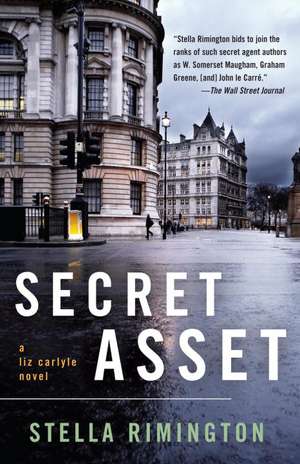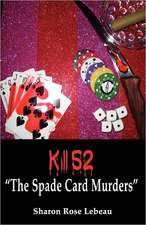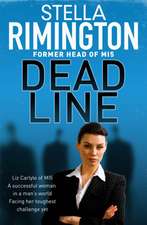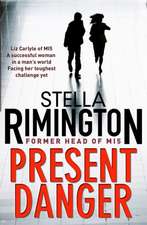Secret Asset
Autor Stella Rimingtonen Limba Engleză Paperback – 30 apr 2008
When it appears a “secret asset”—a sleeper spy—has infiltrated British Intelligence, the Director of Counter-Terrorism assigns Liz Carlyle to dig up the mole. The spy, possibly a former IRA operative now working with British-born Al Qaeda sympathizers, has one thing on his (or her?) mind: total devastation. With a major attack looming, Liz must trust her instincts and move fast. But this assignment is deadly, and suddenly she feels like she has wandered into a wilderness of mirrors, where nothing is what is seems and no-one can be trusted.
| Toate formatele și edițiile | Preț | Express |
|---|---|---|
| Paperback (2) | 53.66 lei 22-33 zile | +19.89 lei 7-13 zile |
| CORNERSTONE – 5 apr 2007 | 53.66 lei 22-33 zile | +19.89 lei 7-13 zile |
| Vintage Books USA – 30 apr 2008 | 110.60 lei 3-5 săpt. |
Preț: 110.60 lei
Nou
Puncte Express: 166
Preț estimativ în valută:
21.16€ • 23.08$ • 17.85£
21.16€ • 23.08$ • 17.85£
Carte disponibilă
Livrare economică 03-17 aprilie
Preluare comenzi: 021 569.72.76
Specificații
ISBN-13: 9781400079827
ISBN-10: 1400079829
Pagini: 362
Dimensiuni: 132 x 203 x 20 mm
Greutate: 0.32 kg
Editura: Vintage Books USA
ISBN-10: 1400079829
Pagini: 362
Dimensiuni: 132 x 203 x 20 mm
Greutate: 0.32 kg
Editura: Vintage Books USA
Notă biografică
Stella Rimington joined MI5 in 1965 and during her thirty-year career she worked in all the main fields of the Service's responsibilities--counter-subversion, counter-espionage, and counter-terrorism--and successively became Director of all three branches. Appointed Director-General of MI5 in 1992, she was the first woman to hold the post and the first Director-General whose name was publicly announced on appointment. Following her retirement from MI5 in 1996, she became a Non-Executive Director of Marks and Spencer and published her autobiography, Open Secret, in the UK.
Extras
Chapter One
In the upmarket bathroom shop in Regent’s Park Road in North London, the slim brown-haired woman was showing a close interest in the display of tiles. “Do you need some help?” asked the young male assistant, who was keen to close since it was almost seven o’clock in the evening.
Liz Carlyle was killing time. In trainers and designer jeans, she looked like any of the wealthy young married women who drifted in and out of the interior-design shops and boutiques of this part of London. But Liz was neither wealthy nor married and she was certainly not drifting. She was very focused indeed. She was waiting for the device she held tightly in her left hand to vibrate once—the signal that it was safe for her to proceed to the meeting in the coffee shop further down the road. In the mirror on the shop wall facing her, she could see Wally Woods, the leader of the A4 team providing counter- surveillance backup, taking his time buying an Evening Standard from the newsvendor on the corner.
He had already sent the two pulses, which signalled that her contact, Marzipan, was inside the café waiting for her. Once his team further up the street on either side were satisfied that no one had followed Marzipan, Wally would send the okay.
A young Asian man, dressed in black jeans and a hooded top, came along from the direction of Chalk Farm Underground Station. Wally and his team watched tensely as he paused to look in an estate agent’s window. Moving on, he crossed over and left Regent’s Park Road, walking off into the distance down a side street. Now the device in Liz’s hand vibrated once. “Thanks very much,” said Liz to the relieved shop assistant. “I’ll bring my husband in tomorrow evening and we’ll decide then.” She left the shop, turned right and walked quickly along the street to the coffee shop, which she entered without hesitating, all under the watchful eyes of the A4 team.
Inside, Liz waited at the counter to order a cappuccino. She felt the familiar tension in her stomach, the quickened beating of her heart, which always accompanied work on the front line. She had missed this excitement. For the last four months or so, she had been on convalescent leave, following a counter-terrorist operation in Norfolk at the end of the previous year.
She’d gone down to her mother’s house in Wiltshire almost immediately after the MI5 doctor had ordered her off work. In the ensuing weeks she’d soon been well enough to help her mother in the garden centre she ran. On days off, they’d visited National Trust houses and cooked elaborate dinners for two; occasionally, at the weekend they would socialise with friends from the neighbourhood. It had been pleasant, tranquil, and agonisingly uneventful. Now on this May evening she was happy to be back at the sharp end of operations.
She had returned to work only that week. “Take your time. Settle in,” Charles Wetherby had told her, and back in her office in the counter-terrorism agent-running section she had started with the mountain of paperwork, which had accumulated in her absence. But then the message had come that afternoon from Marzipan—code name for Sohail Din—urgently requesting a meeting. Strictly speaking, Marzipan was no longer Liz’s business. Her colleague Dave Armstrong had taken him over, along with the immense promise of reliable information that he represented, the minute she had left. But for the moment Dave was in Leeds on urgent business and Liz, as Marzipan’s original recruiter and runner, had been the obvious choice to stand in.
She took her coffee and walked to the gloomy back of the café where Marzipan was sitting at a small corner table, reading a book. “Hello Sohail,” she said quietly, sitting down.
He closed his book and looked at her in surprise. “Jane!” he exclaimed, using the name he knew her by. “I was not expecting you, but I am so happy to see you.”
She had forgotten how young he looked, but then, he was young. When Liz had first met Sohail Din, more than a year before, he had already been accepted to read Law at Durham University. He was still less than twenty. He had taken a job in his gap year at a small Islamic bookshop in Haringey. Though it was not well paid, he had hoped it would provide an opportunity for religious discussion with other serious-minded young men like himself. But he had soon found that the bookshop was a focal point for radical Islamist doctrine—not at all the version of Islam that Sohail had learned at home and at his local mosque. He had been shocked by the casual talk of fatwas and jihad, then still more to find that some of his fellow employees openly supported the tactics of suicide bombers, even boasting of taking up arms themselves against the West. And finally he had come to realise that some of the people who came into the shop were actively involved in terrorist activities. That was when he had decided to act himself. He had found a police station some distance away and had told his story to a Special Branch officer. He was moved quickly through a well-tried route to MI5 and his first contact there, Liz Carlyle. She had recruited him and had developed him as a long-term agent, persuading him to put off his university career for a year. In the months that followed, Marzipan had provided invaluable information about the comings and goings of people of interest to MI5 and the police.
“It’s very good to see you again, Sohail,” said Liz. “You look well.”
Marzipan put down his book, saying nothing, but gazing at her gently, solemnly, his eyes large through his spectacles. Liz could see that he was on edge.
“Are you looking forward to university?” she said, wanting to put him more at ease.
“Very much,” he said earnestly.
“Good. You will do very well there, you know. And we are very grateful to you for delaying your studies.” Gently, she made the transition to business. “Your message said you needed to see us urgently. Has something happened?”
Now the young man—not much more than a boy, thought Liz—said, “Two weeks ago, a man visited the bookshop. One of the boys in the shop told me he was an important Imam visiting from Pakistan, and I thought I recognised his face from one of the videos we sell in the shop. I told this to Simon. He said that if the man came back to the shop I should contact him immediately.”
Simon Willis was Dave Armstrong’s working alias. Liz asked, “And you’ve seen this man again?”
Sohail Din nodded. “This afternoon. He did not come into the shop. He was upstairs, with three other men. Young men, though one was older than the others. They were British Asians.”
“Are you sure?”
“I am certain. I heard them speak. You see, I was sent upstairs to fix the video player. Aswan—he works in the shop—had installed it, but today is his day off. He had not connected it properly to the aerial.”
“What were they watching?”
“A video the Imam had brought—there was a stack of them next to the VCR. They had one of these in the machine.”
The door to the café opened and Sohail peered over Liz’s shoulder. But it was only two young women, laden with carrier bags, coming in for coffee after their shopping. Sohail continued, “When I connected the recorder to the aerial I turned on the machine to make sure it was working properly. That’s when I saw part of the video they were watching.”
He paused, and Liz suppressed her impatience and waited for him to resume. “It was a video of this same man, the Imam. He was speaking in Urdu, which I do not understand well—but from hearing it at home I know a little. He was saying that sometimes it was necessary to die for one’s belief; he was talking about a holy war.”
She said, “Did you see any more than that?”
Sohail shook his head. “Not then. I didn’t stay; I didn’t want them to think I was paying much attention.”
“Why do you think they were watching it? I mean, if the Imam was there anyway.”
Sohail paused for a moment. “I have thought carefully about this. It came to my mind that he had come here to tutor the men. Maybe to prepare them.”
“Prepare them?”
Sohail added quietly, “I think he was preparing them for a mission. Perhaps a suicide mission. They talk about these things in the shop.”
Liz was surprised. This seemed a very dramatic conclusion. The Marzipan she had known had been calm and levelheaded; now he seemed frightened and overexcited. Liz asked calmly, “Why do you think that?”
Suddenly Sohail reached down and brought a small paper bag out of his knapsack. He slid it across the table. “Here’s why.”
“What’s in there?” she asked.
“I brought the video. The Imam left it behind, along with the other tapes. I went upstairs and watched it just before we closed.”
Liz quickly put the video into her bag, pleased that Sohail had brought it, but also appalled by the risk he was taking. “Well done, Sohail,” she said, “but won’t they notice that it’s gone?”
“There were many other videos upstairs. And I am sure no one saw me go up there.”
“It will have to go back quickly,” she said firmly. “But tell me first, these three men, how old were they?”
“The young ones were about my age. The other one perhaps in his late twenties.”
“You said they were British. Did you notice anything about their accents?”
“It is difficult to say.” He thought for a moment. “Except the older one. I think he came from the North.”
“Would you recognise them again?”
“I can’t be sure. I didn’t want to look at them too carefully.”
“Of course,” said Liz soothingly, for she could see that Sohail’s eyes kept returning to the door. “Do you have any idea where these three have gone to?”
“No, but I know they’ll be back.”
Liz felt her pulse pick up. “Why? When?”
“The same time next week. Aswan asked if he should bring the machine down. But the owner said not to bother, as it would be needed again on Thursday. That is why I think they are in training. There is a series of videos for them to watch. It is a sort of course they are doing.”
“How do you know it will be the same men?”
Sohail thought for a moment. “Because of the way he said it. ‘Leave it,’ he said, ‘they’ll need it again next week.’ The way he said ‘they’ll’ could only mean the same men.”
Liz considered this. They had some time, then, though not very much, to put an operation in place before the group reconvened. She thought hard for a moment, trying to decide what to do next. “Tell me, could you meet me again later this evening? I’d like to go and copy the video, and also collect some photographs for you to look at. Photographs of people. Can you do that?”
Sohail nodded.
“Let me tell you where to go.” She gave him an address in one of the anonymous streets north of Oxford Street and made him repeat it back to her. Then she said, “Take the Underground to Oxford Circus and walk west. Do you know where John Lewis is?” Sohail nodded. “So this is what you do to get to the house. We will make sure you aren’t being followed, but if we are not happy, someone will stop you on the street and ask you for the time. They’ll ask you twice—and if that happens do not go to the safe house. Walk straight on, catch a bus and go home. And just in case you run into anyone you know, have an excuse ready for what you’re doing there.”
“That’s easy,” said Sohail. “I’ll say I’ve been looking for CDs at the HMV shop on Oxford Street. They stay open late.”
Liz looked at her watch. “It’s now seven-thirty. I will meet you there at ten o’clock.”
“Will you be my contact again from now on?” he asked.
“We’ll see,” she said mildly, for in truth she didn’t know herself. “It doesn’t matter, you know. We all work together.”
He nodded but there was a look in his eyes which Liz at first took for simple excitement, then realised was partly fear. She smiled reassuringly at him. “You are doing a brilliant job. Just go on being very careful, Sohail.”
He smiled back at her a little bleakly, his eyes darkening. She added, “If you ever feel you are in any danger, you must tell us at once. Use the alert procedure. We do not expect you to put yourself in unnecessary danger.”
She knew these were empty words. Of course he must be in jeopardy; in such operations risk was inevitable. Not for the first time, Liz questioned her participation in the subtle psychological game of agent running: cautioning the agent to be careful, acknowledging the danger he was in, reassuring him that he would be protected, encouraging him to obtain the information that was needed. The only justification was the harm she was trying to prevent, but faced with a Marzipan, it seemed a difficult balance to preserve.
But Sohail said simply, resolutely, “I will do everything I can.” Liz was moved but his words did nothing to relieve her feelings of guilt. He was so very young, and yet so very brave. If these men in the bookshop were happy to blow themselves up, she hated to think what they would be happy to do to Sohail. Involuntarily almost, she shook her head and turned away.
From the Hardcover edition.
In the upmarket bathroom shop in Regent’s Park Road in North London, the slim brown-haired woman was showing a close interest in the display of tiles. “Do you need some help?” asked the young male assistant, who was keen to close since it was almost seven o’clock in the evening.
Liz Carlyle was killing time. In trainers and designer jeans, she looked like any of the wealthy young married women who drifted in and out of the interior-design shops and boutiques of this part of London. But Liz was neither wealthy nor married and she was certainly not drifting. She was very focused indeed. She was waiting for the device she held tightly in her left hand to vibrate once—the signal that it was safe for her to proceed to the meeting in the coffee shop further down the road. In the mirror on the shop wall facing her, she could see Wally Woods, the leader of the A4 team providing counter- surveillance backup, taking his time buying an Evening Standard from the newsvendor on the corner.
He had already sent the two pulses, which signalled that her contact, Marzipan, was inside the café waiting for her. Once his team further up the street on either side were satisfied that no one had followed Marzipan, Wally would send the okay.
A young Asian man, dressed in black jeans and a hooded top, came along from the direction of Chalk Farm Underground Station. Wally and his team watched tensely as he paused to look in an estate agent’s window. Moving on, he crossed over and left Regent’s Park Road, walking off into the distance down a side street. Now the device in Liz’s hand vibrated once. “Thanks very much,” said Liz to the relieved shop assistant. “I’ll bring my husband in tomorrow evening and we’ll decide then.” She left the shop, turned right and walked quickly along the street to the coffee shop, which she entered without hesitating, all under the watchful eyes of the A4 team.
Inside, Liz waited at the counter to order a cappuccino. She felt the familiar tension in her stomach, the quickened beating of her heart, which always accompanied work on the front line. She had missed this excitement. For the last four months or so, she had been on convalescent leave, following a counter-terrorist operation in Norfolk at the end of the previous year.
She’d gone down to her mother’s house in Wiltshire almost immediately after the MI5 doctor had ordered her off work. In the ensuing weeks she’d soon been well enough to help her mother in the garden centre she ran. On days off, they’d visited National Trust houses and cooked elaborate dinners for two; occasionally, at the weekend they would socialise with friends from the neighbourhood. It had been pleasant, tranquil, and agonisingly uneventful. Now on this May evening she was happy to be back at the sharp end of operations.
She had returned to work only that week. “Take your time. Settle in,” Charles Wetherby had told her, and back in her office in the counter-terrorism agent-running section she had started with the mountain of paperwork, which had accumulated in her absence. But then the message had come that afternoon from Marzipan—code name for Sohail Din—urgently requesting a meeting. Strictly speaking, Marzipan was no longer Liz’s business. Her colleague Dave Armstrong had taken him over, along with the immense promise of reliable information that he represented, the minute she had left. But for the moment Dave was in Leeds on urgent business and Liz, as Marzipan’s original recruiter and runner, had been the obvious choice to stand in.
She took her coffee and walked to the gloomy back of the café where Marzipan was sitting at a small corner table, reading a book. “Hello Sohail,” she said quietly, sitting down.
He closed his book and looked at her in surprise. “Jane!” he exclaimed, using the name he knew her by. “I was not expecting you, but I am so happy to see you.”
She had forgotten how young he looked, but then, he was young. When Liz had first met Sohail Din, more than a year before, he had already been accepted to read Law at Durham University. He was still less than twenty. He had taken a job in his gap year at a small Islamic bookshop in Haringey. Though it was not well paid, he had hoped it would provide an opportunity for religious discussion with other serious-minded young men like himself. But he had soon found that the bookshop was a focal point for radical Islamist doctrine—not at all the version of Islam that Sohail had learned at home and at his local mosque. He had been shocked by the casual talk of fatwas and jihad, then still more to find that some of his fellow employees openly supported the tactics of suicide bombers, even boasting of taking up arms themselves against the West. And finally he had come to realise that some of the people who came into the shop were actively involved in terrorist activities. That was when he had decided to act himself. He had found a police station some distance away and had told his story to a Special Branch officer. He was moved quickly through a well-tried route to MI5 and his first contact there, Liz Carlyle. She had recruited him and had developed him as a long-term agent, persuading him to put off his university career for a year. In the months that followed, Marzipan had provided invaluable information about the comings and goings of people of interest to MI5 and the police.
“It’s very good to see you again, Sohail,” said Liz. “You look well.”
Marzipan put down his book, saying nothing, but gazing at her gently, solemnly, his eyes large through his spectacles. Liz could see that he was on edge.
“Are you looking forward to university?” she said, wanting to put him more at ease.
“Very much,” he said earnestly.
“Good. You will do very well there, you know. And we are very grateful to you for delaying your studies.” Gently, she made the transition to business. “Your message said you needed to see us urgently. Has something happened?”
Now the young man—not much more than a boy, thought Liz—said, “Two weeks ago, a man visited the bookshop. One of the boys in the shop told me he was an important Imam visiting from Pakistan, and I thought I recognised his face from one of the videos we sell in the shop. I told this to Simon. He said that if the man came back to the shop I should contact him immediately.”
Simon Willis was Dave Armstrong’s working alias. Liz asked, “And you’ve seen this man again?”
Sohail Din nodded. “This afternoon. He did not come into the shop. He was upstairs, with three other men. Young men, though one was older than the others. They were British Asians.”
“Are you sure?”
“I am certain. I heard them speak. You see, I was sent upstairs to fix the video player. Aswan—he works in the shop—had installed it, but today is his day off. He had not connected it properly to the aerial.”
“What were they watching?”
“A video the Imam had brought—there was a stack of them next to the VCR. They had one of these in the machine.”
The door to the café opened and Sohail peered over Liz’s shoulder. But it was only two young women, laden with carrier bags, coming in for coffee after their shopping. Sohail continued, “When I connected the recorder to the aerial I turned on the machine to make sure it was working properly. That’s when I saw part of the video they were watching.”
He paused, and Liz suppressed her impatience and waited for him to resume. “It was a video of this same man, the Imam. He was speaking in Urdu, which I do not understand well—but from hearing it at home I know a little. He was saying that sometimes it was necessary to die for one’s belief; he was talking about a holy war.”
She said, “Did you see any more than that?”
Sohail shook his head. “Not then. I didn’t stay; I didn’t want them to think I was paying much attention.”
“Why do you think they were watching it? I mean, if the Imam was there anyway.”
Sohail paused for a moment. “I have thought carefully about this. It came to my mind that he had come here to tutor the men. Maybe to prepare them.”
“Prepare them?”
Sohail added quietly, “I think he was preparing them for a mission. Perhaps a suicide mission. They talk about these things in the shop.”
Liz was surprised. This seemed a very dramatic conclusion. The Marzipan she had known had been calm and levelheaded; now he seemed frightened and overexcited. Liz asked calmly, “Why do you think that?”
Suddenly Sohail reached down and brought a small paper bag out of his knapsack. He slid it across the table. “Here’s why.”
“What’s in there?” she asked.
“I brought the video. The Imam left it behind, along with the other tapes. I went upstairs and watched it just before we closed.”
Liz quickly put the video into her bag, pleased that Sohail had brought it, but also appalled by the risk he was taking. “Well done, Sohail,” she said, “but won’t they notice that it’s gone?”
“There were many other videos upstairs. And I am sure no one saw me go up there.”
“It will have to go back quickly,” she said firmly. “But tell me first, these three men, how old were they?”
“The young ones were about my age. The other one perhaps in his late twenties.”
“You said they were British. Did you notice anything about their accents?”
“It is difficult to say.” He thought for a moment. “Except the older one. I think he came from the North.”
“Would you recognise them again?”
“I can’t be sure. I didn’t want to look at them too carefully.”
“Of course,” said Liz soothingly, for she could see that Sohail’s eyes kept returning to the door. “Do you have any idea where these three have gone to?”
“No, but I know they’ll be back.”
Liz felt her pulse pick up. “Why? When?”
“The same time next week. Aswan asked if he should bring the machine down. But the owner said not to bother, as it would be needed again on Thursday. That is why I think they are in training. There is a series of videos for them to watch. It is a sort of course they are doing.”
“How do you know it will be the same men?”
Sohail thought for a moment. “Because of the way he said it. ‘Leave it,’ he said, ‘they’ll need it again next week.’ The way he said ‘they’ll’ could only mean the same men.”
Liz considered this. They had some time, then, though not very much, to put an operation in place before the group reconvened. She thought hard for a moment, trying to decide what to do next. “Tell me, could you meet me again later this evening? I’d like to go and copy the video, and also collect some photographs for you to look at. Photographs of people. Can you do that?”
Sohail nodded.
“Let me tell you where to go.” She gave him an address in one of the anonymous streets north of Oxford Street and made him repeat it back to her. Then she said, “Take the Underground to Oxford Circus and walk west. Do you know where John Lewis is?” Sohail nodded. “So this is what you do to get to the house. We will make sure you aren’t being followed, but if we are not happy, someone will stop you on the street and ask you for the time. They’ll ask you twice—and if that happens do not go to the safe house. Walk straight on, catch a bus and go home. And just in case you run into anyone you know, have an excuse ready for what you’re doing there.”
“That’s easy,” said Sohail. “I’ll say I’ve been looking for CDs at the HMV shop on Oxford Street. They stay open late.”
Liz looked at her watch. “It’s now seven-thirty. I will meet you there at ten o’clock.”
“Will you be my contact again from now on?” he asked.
“We’ll see,” she said mildly, for in truth she didn’t know herself. “It doesn’t matter, you know. We all work together.”
He nodded but there was a look in his eyes which Liz at first took for simple excitement, then realised was partly fear. She smiled reassuringly at him. “You are doing a brilliant job. Just go on being very careful, Sohail.”
He smiled back at her a little bleakly, his eyes darkening. She added, “If you ever feel you are in any danger, you must tell us at once. Use the alert procedure. We do not expect you to put yourself in unnecessary danger.”
She knew these were empty words. Of course he must be in jeopardy; in such operations risk was inevitable. Not for the first time, Liz questioned her participation in the subtle psychological game of agent running: cautioning the agent to be careful, acknowledging the danger he was in, reassuring him that he would be protected, encouraging him to obtain the information that was needed. The only justification was the harm she was trying to prevent, but faced with a Marzipan, it seemed a difficult balance to preserve.
But Sohail said simply, resolutely, “I will do everything I can.” Liz was moved but his words did nothing to relieve her feelings of guilt. He was so very young, and yet so very brave. If these men in the bookshop were happy to blow themselves up, she hated to think what they would be happy to do to Sohail. Involuntarily almost, she shook her head and turned away.
From the Hardcover edition.
Recenzii
“Stella Rimington bids to join the ranks of such secret agent-authors as W. Somerset Maugham, Graham Greene, [and] John le Carré.”—The Wall Street Journal“Welcome a new queen of the genre. . . . Stella Rimington, who was the first female director of MI-5, knows of what she writes.”—The Washington Times “Intelligent, vivid . . . [with] rich insider detail.” —The Plain Dealer “Brisk pacing and intelligent attention to detail make this thriller one of the better spy stories of recent times.” —Mystery Scene
Descriere
Descriere de la o altă ediție sau format:
When Intelligence Officer Liz Carlyle learns from one of her agents that suspicious meetings are taking place at an Islamic bookshop, she trusts her instinct that a terrorist cell is at work. Her boss, Charles Wetherby, immediately puts a surveillance operation into place. An attack seems imminent.
When Intelligence Officer Liz Carlyle learns from one of her agents that suspicious meetings are taking place at an Islamic bookshop, she trusts her instinct that a terrorist cell is at work. Her boss, Charles Wetherby, immediately puts a surveillance operation into place. An attack seems imminent.

























